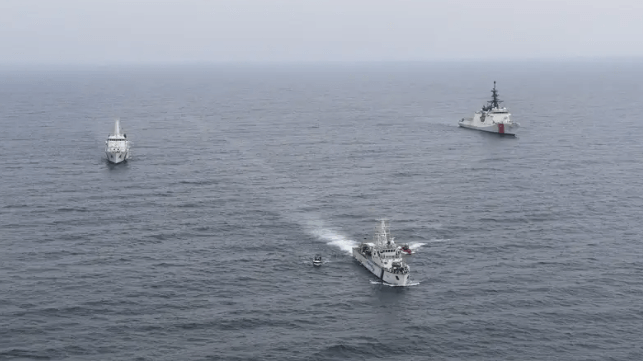Members of the Quad Plan First Joint Coast Guard Patrols

The governments of the U.S., Australia, India and Japan have agreed to start joint coast guard patrols in the Indo-Pacific, a substantial step towards combined maritime operations under the banner of the "Quad."
The Quad is widely viewed as a counterbalance to Chinese ambitions, a view that Beijing shares. The White House has tried to dispel the sense that this Indo-Pacific alliance is focused on a shared interest in China, but when President Biden hosted the Quad's latest meeting on Saturday, China was the first item on the agenda - and Biden quietly told his counterparts that China is pushing the boundaries in all its relations with the United States, including "economic and technology issues."
"We believe [Chinese President] Xi Jinping is looking to focus on domestic economic challenges and minimize the turbulence in China’s diplomatic relationships, and he’s also looking to buy himself some diplomatic space, in my view, to aggressively pursue China’s interest," Biden told Indian Prime Minister Narendra Modi, Australian Prime Minister Anthony Albanese and Japanese Prime Minister Fumio Kishida in a hot-mic moment. "China continues to behave aggressively, testing us all across the region, and it’s true in the South China Sea, the East China Sea, South China, South Asia and the Taiwan Straits."

that matters most
Get the latest maritime news delivered to your inbox daily.
The most notable agreement to emerge from the meeting - Biden's last - is the "Quad-at-Sea Ship Observer Mission," set to begin next year. While few details were provided, the mission's objective will be to monitor fishing vessels for illegal activity, according to the Japan Times. China has the world's largest distant-water fishing fleet, and its fishing operators have been repeatedly linked to illegal, unauthorized and unreported (IUU) fishing. The Quad mission will also see the U.S. Coast Guard, Japan Coast Guard, Australian Border Force, and Indian Coast Guard work together to "improve interoperability and advance maritime safety" in the Indo-Pacific.
The initiative builds on a 2022 program to help Pacific nations build up their maritime domain awareness capabilities, and specifically their awareness of fishery violations. So far, the Indo-Pacific Partnership for Maritime Domain Awareness (IPMDA) has helped two dozen countries access data on "dark" vessel operations so that they can watch activity in their exclusive economic zones. "Quad partners intend to layer new technology and data into IPMDA over the coming year, to continue to deliver cutting edge capability and information to the region," the nations said in a joint statement.
